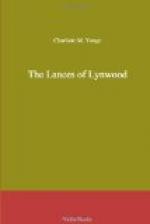“No, indeed,” said Leonard. “Strange that the touch of the Prince’s sword should make so great a difference between him and me.”
“If it was the touch of the Prince’s sword that did so,” said Gaston.
“What else?” sharply retorted Leonard. “Not height nor strength! His hand and arm might belong to a girl, I could crush it in my grasp.” So saying, he extended a huge, hard, red palm.
“Ay?” said Gaston; “I should like to see whether that great paw would have won Du Guesclin’s sword.”
“I tell you flatly,” proceeded Ashton, “I might follow Sir Reginald, since he was a man of substance, honoured in our country, and my father meant to oblige and do him grace by placing me with him.”
“Grace!” repeated Gaston.
“But,” continued Ashton, angrily, “as to serving Eustace, the clerk, no older than myself, half a head shorter, and a mere landless upstart, that my father’s son shall never do!”
“Say you so?” said Gaston. “I recommend you not to do so quite so loud, or perchance the landless upstart might hand your father’s son over to the Provost Marshal, for preaching disaffection to his men. And, in good time, here comes the Master Armourer.”
The rest of the day was spent by Gaston in the arrangement of the equipments, so important in his estimation, and scarcely another word was spoken save on the choice of helm and shield, and the adaptation of crests and blazonry. The next point for consideration was the disposal of the prisoners taken by the Lances of Lynwood in the early part of the battle. Two were Squires, the other four, rough-looking men-at-arms who protested that they could not pay one denier towards their ransom. Eustace liberated them, and was greatly inclined to do the same by the Squires; but Gaston assured him it would be doing wrong to the Prince’s cause to set the rogues free without taking some good French crowns from them, and therefore, permitting him to name what ransom he thought fit, he returned to them their horses, and dismissed them to collect the sum.
Early the next morning, Gaston had the satisfaction of beholding his young banneret arrayed in knightly guise, the golden spurs on his heels, Du Guesclin’s sword by his side, and his white mantle flung over his shoulder. Leonard was summoned to accompany him, but he growled out something so like an absolute refusal and utter disclaimer of all duty to Sir Eustace, that Gaston began to reproach him vehemently.
“Never mind, Gaston,” said Eustace, “you never mend matters with him in that way, I shall do very well alone.”
“So you shall never go,” said Gaston, rising; “I will go myself, I have been longing to see you received by the Prince. Where is my sword?”
“Nay, Gaston,” said Eustace, “that must not be. See how the hot sunbeams lie across that hill between us and the Prince’s tent. You must not waste your strength if it is true that we are to journey to Burgos to-day.”




